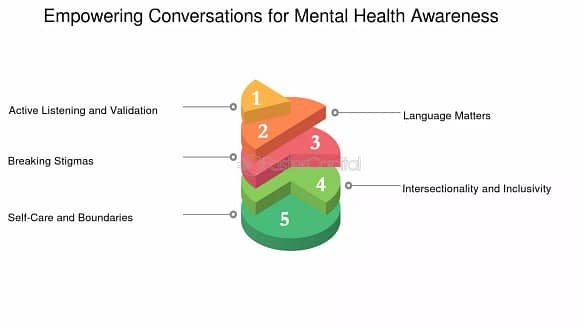Although stigma related to mental health has progressively opened up in the past years, a teen struggling with his or her mental health can pretty much always be met with misunderstanding, shame, or complete silence. The stigma of mental illness keeps young people from seeking out much-needed help and support and condemns them to prolonged suffering. It is now time to break this cycle and to create a culture where discussing mental health is as normal as talking about physical health.
Understanding the Stigma
Stigma refers to the negative attitude, stereotype, and misconception that surrounds something, in this case, something to do with mental health. Teens experiencing anxiety, depression, or other types of mental health are often stereotyped as “dramatic,” “attention-seeking,” or “weak.” Such stereotyping tends to discourage youngsters from coming forward for support and assistance. The stigma can come from various sources:
Society: It is mostly the social norms that give the belief that mental struggles are due to weakness, or so they are looked at much differently compared to physical illness. This often prevents one from discussing their emotional and mental turmoil with their doctor or people close to them. Such stigma attached has made it a priority concern when it comes to mental health.
Peers: There is often pressure at schools and within social circles to appear “perfect,” and fear of judgment or ridicule should the teenager open up with their issues regarding mental health.
Cultural or Familial Influences: Not all cultures or families discuss issues of mental health openly. Seeking help for problems with one’s mind may be taboo.
The Effect of Stigma on Teenagers
Stigma can be so destructive for teenagers. While adolescence is an age of development, growth, and social maturation, sometimes it may prove to be a very tender age. The stigma attached to the struggle with mental health makes the teenagers internalize the negative feelings of themselves. This might lead to:
Isolation: The teens might go inside their shells for concealing the problem out of guilt or fear of judgment.
Avoiding help: Many teens delay or avoid seeking professional help due to a belief that they can “tough it out” or a fear of being perceived by others differently.
Symptoms worsening: If they do not get appropriate support, struggles with mental health can worsen, leading to an increase in emotional distress and dangerous behaviors such as self-harm and substance abuse.
Lower self-esteem: Constantly keeping their struggles hidden may make a teenager feel inadequate and really nurture the belief that something is “wrong” with them.
Why conversations count
Having a conversation on mental health could be just what tips the scales to break the stigma. The minute teenagers know they can talk about their feelings, struggles, and experiences with anyone, they will feel less lonely. Here’s why having such conversations is important:
1. Normalizing Mental Health
Talking about your mental health openly normalizes it. Mental health is part of health, and it is like physical health because it needs attention and, most importantly, care. Where teens realize it is okay maybe not to feel okay, they will be sure to speak up for help when needed.
2. Offering Support
When mental health is brought up, teens learn that there’s help around them, not just from their friends but also from professionals. It’s easier to ask for help knowing that others are willing to listen without judgment. Having a place to share thoughts can be a huge relief.
3. Breaking the Cycle of Shame
Stigma depends on silence. The more we talk about mental health, the less it can be stigmatized. As teens start to hear friends, family members, and role models speak openly and honestly about their struggles with mental health, they start to learn that seeking help is a sign of strength, not weakness.
4. Early Intervention
Therefore, early intervention is an important means in the management of mental health issues. When teens can talk freely about mental health, they are in a position to recognize warning signs and get the help they need early on, before problems escalate.
5. Promoting Empathy and Understanding
Openness brings empathy and understanding. While learning about the experience others go through with their mental health, teens become kinder and less judgmental. Then, this would create a friendly atmosphere where everyone will be important and heard.

How to Start the Conversation
For many teens, initiating a conversation about mental health can be pretty daunting. But even little effort counts. Here are some ways by which you may get the conversation going:
Educate yourself: Understand the basics of common mental health conditions such as anxiety, depression, and stress. This helps you show empathy in your approach.
Regular check-ins: Let this be a part of daily conversations or discussions with friends or family. A simple question like “How are you, really?” or “Is there anything on your mind?” asks for more than just a superficial response.
Share Your Experience: If you have struggled with issues, do not be afraid to share them. Sometimes your vulnerability can help others to share their experiences, too.
Listen Without Judgment: If a friend does confide in you, then just listen-without judgment. You may offer your support, but not unsolicited advice or minimizing their feelings. Sometimes being present works just as well as anything else you could say or do.
Access to Resources: It’s very important that teens have access to resources like school counselors, helplines, or mental health apps that offer them support in times of distress. Allow teenagers to understand that professional help is both available and accessible.
The Role of Schools and Communities
Addressing the stigma associated with teen mental health requires a significant role by schools, communities, and families. Mental health awareness programs, workshops, and campaigns could be organized for both teenagers and adults on the value of psychological wellbeing. Schools should establish peer support groups, counseling services, and integrate education about mental health into the curriculum.
It will take time to overcome the stigma surrounding teen mental health, but with one more conversation at a time, we get closer. Teens need to know they are never alone and that seeking help isn’t something that makes them weak. We normalize these conversations, and in
the process, create an environment conducive enough to help our youth bring about a better future where mental health is just as important as physical health.





